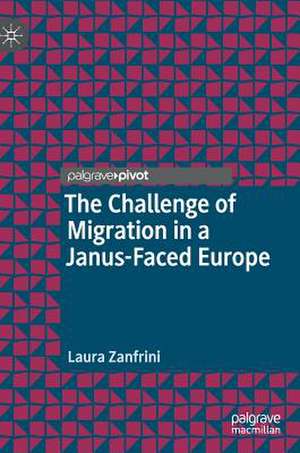The Challenge of Migration in a Janus-Faced Europe
Autor Laura Zanfrinien Limba Engleză Hardback – 29 noi 2018
This book critically investigates the origins and consequences of the Janus-faced character of attitudes and policies towards migrants that seek to penetrate “Fortress Europe”. Beginning with an examination of its founding ambitions, it locates the roots of an ingrained ambivalence in the legacies of the post-war period and the unresolved tension between the economicism of the European approach to labour migration and the philosophy of rights and solidarity embedded in the EU project. It highlights how the formalization of citizenship rights has produced both formal pathways towards inclusion for migrants and, in their selective eligibility criteria, exclusive systems of civic stratification. The author links this oscillation between positions of closure and openness to the paradoxical trade-offs in migration policies, in particular labour market integration, demonstrated through unequal labour market outcomes, lower social mobility and educational attainments. The issues faced by migrants’ offspring in Europe are examined as paradigmatic of the struggle to balance competing calls for both pluralism and uniformity: to create a diverse society that can also project a homogenous collective identity. This balanced overview will provide an invaluable resource for students of migration studies, European politics, public policy, international relations and the sociology of racism.
Preț: 472.36 lei
Preț vechi: 555.72 lei
-15% Nou
Puncte Express: 709
Preț estimativ în valută:
90.38€ • 94.87$ • 75.02£
90.38€ • 94.87$ • 75.02£
Carte tipărită la comandă
Livrare economică 10-24 aprilie
Preluare comenzi: 021 569.72.76
Specificații
ISBN-13: 9783030011017
ISBN-10: 3030011011
Pagini: 147
Ilustrații: IX, 167 p. 1 illus.
Dimensiuni: 148 x 210 mm
Greutate: 0.45 kg
Ediția:1st ed. 2019
Editura: Springer International Publishing
Colecția Palgrave Pivot
Locul publicării:Cham, Switzerland
ISBN-10: 3030011011
Pagini: 147
Ilustrații: IX, 167 p. 1 illus.
Dimensiuni: 148 x 210 mm
Greutate: 0.45 kg
Ediția:1st ed. 2019
Editura: Springer International Publishing
Colecția Palgrave Pivot
Locul publicării:Cham, Switzerland
Cuprins
Chapter 1: Introduction. The Unexpected Legacy of the post-WWII Migratory Regime.- Chapter 2:The (Un)Ethical Foundations of the Borders of Membership. Inclusion versus Exclusion.- Chapter 3: The “Schizophrenia” of the European Approach. Equality versus Discrimination.- Chapter 4: The Identity Challenge. Diversity versus Uniformity.- Chapter 5: The (Un)Ethical Boundaries of the European Fortress. Openness versus Closure.- Chapter 6: Conclusions. The refugee crisis: A Prophetic Challenge for European Societies.
Notă biografică
Laura Zanfrini is Full Professor in the Faculty of Political and Social Science and Scientific Director of the WWELL research centre at the Catholic University of Milan, and head of the Economic and Labour Department at ISMU Foundation, Italy.
Textul de pe ultima copertă
‘Laura Zanfrini’s persuasively-argued work provides a succinct discussion on the politics of immigration and the legacies of the guestworker model with original analysis that highlights the paradoxes of immigration governance.’
—Erica Consterdine, Sussex Centre for Migration Research, University of Sussex, UK
This book critically investigates the origins and consequences of the Janus-faced character of attitudes and policies towards migrants that seek to penetrate “Fortress Europe”. Beginning with an examination of its founding ambitions, it locates the roots of an ingrained ambivalence in the legacies of the post-war period and the unresolved tension between the economicism of the European approach to labour migration and the philosophy of rights and solidarity embedded in the EU project. It highlights how the formalization of citizenship rights has produced both formal pathways towards inclusion for migrants and, in their selective eligibilitycriteria, exclusive systems of civic stratification. The author links this oscillation between positions of closure and openness to the paradoxical trade-offs in migration policies, in particular labour market integration, demonstrated through unequal labour market outcomes, lower social mobility and educational attainments. The issues faced by migrants’ offspring in Europe are examined as paradigmatic of the struggle to balance competing calls for both pluralism and uniformity: to create a diverse society that can also project a homogenous collective identity. This balanced overview will provide an invaluable resource for students of migration studies, European politics, public policy, international relations and the sociology of racism.
Caracteristici
Demonstrates how tensions embedded in the EU project shape responses to migrants and refugees Offers original insights into to the paradoxes of migration policies in Europe by emphasizing the importance of legacies of the post war period Examines how policy legacies affect second generation migrants and policymaking at both national and local levels Argues that understanding this ingrained ambivalence must be the first step to tackling present-day migration issues, creating a sustainable management of migration flows and maintaining social cohesion and democracy Analyses migration governance in a broad range of European countries including France, Germany, Italy,The Netherlands and Spain
